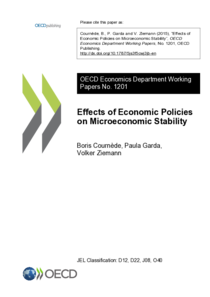Effects of economic policies on microeconomic stability

Cournède, Boris ; Garda, Paula ; Ziemann, Volker
Organisation for Economic Co-operation and Development, Paris
OECD Publishing - Paris
2015
62 p.
economic growth ; economic policy ; social expenditure ; stability ; well being
OECD Economics Department Working Papers
1201
Economic development
http://dx.doi.org/10.1787/5js3f5cwj3jb-en
English
Bibliogr.
"Economic policies shape how much people earn as well as how stable their income and jobs are. The level and stability of earnings both matter for well-being. Standard economic aggregates do not measure accurately the economic uncertainty which households are facing. This paper shows that household-level economic instability is only very loosely related to macroeconomic volatility. It uses several household-level databases to document how pro-growth reforms influence household-level economic stability. Movement from less to more productive processes and firms is at the heart of economic growth, which suggests a trade-off between growth and micro-level stability. Certain policy changes boost growth but increase micro-level instability: they include reductions in tax progressivity or social transfers (including unemployment benefits) as well as moves from very to moderately tight restrictions on the flow of goods and services and on the dismissal of regular workers. However, the analysis also uncovers that moving to highly competitive policies generally reduces micro-level instability."
Digital
The ETUI is co-funded by the European Union. Views and opinions expressed are however those of the author(s) only and do not necessarily reflect those of the European Union or the ETUI.